Employee Role Management allows you to define roles, property portfolio, and access rights for employees. Roles are assigned to employees, which allow the following enhancements:
▪Security access rights can be pushed to selected employees as necessary
▪Employees with Role assignments can access a different Property Portfolio list when accessing properties through the Property List user panel
▪Report Generator can use Roles when emailing a group of employee's reports
Employee Role Management is accessed through SETUP | Configuration Group | Employee Role Management.
It is broken down into 3 tabs: Employee, Portfolio and Security.
Employee tab:
The Employee tab is where the roles are created and defined.
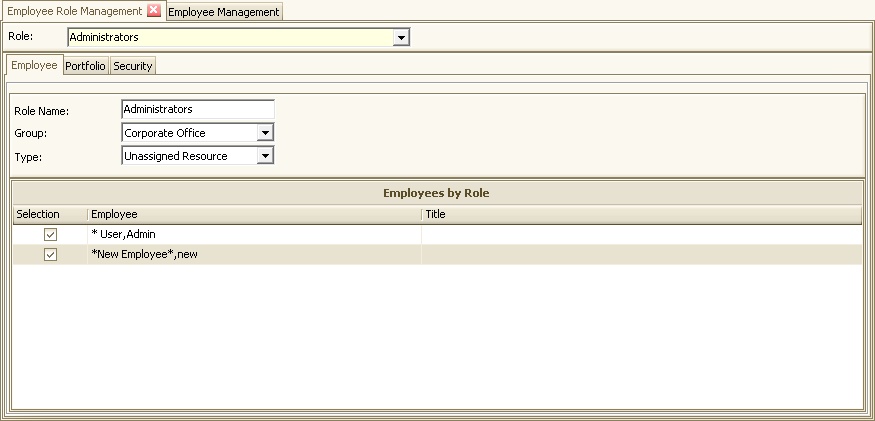 UsEbt
UsEbt
The fields are defined as follows:
Field |
Description |
|---|---|
Role Name |
The name the user has given to a particular role. |
Group |
Defined in SETUP | Configuration Group | Program Defaults | Codes | Employee Group. The Group name is selected to define which group a user is part of. Only one Group name can be selected per Role. The Group name chosen can be based on the employee's position, their physical location, or any other descriptive word that may fit within your company. This will be used to link employee records. |
Type |
Defined in SETUP | Configuration Group | Program Defaults | Codes | Employee Type. The Type chosen further defines the Role. This will be used to link employee records. |
Selection |
Click the box to link the employee to the Role. |
Employee |
Lists the names of the employees linked to the Role. |
Title |
Includes the Title of the employee. This information pulls from SETUP | Configuration Group | Employee Management | Title field in employee's profile. |
Portfolio tab:
The Portfolio tab is where the properties are linked to the Role.
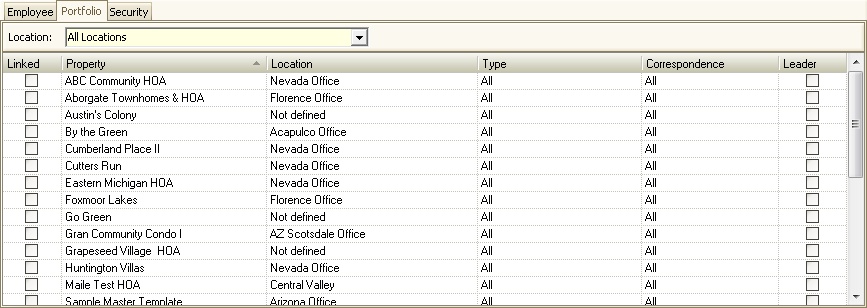
This topic was previously covered in CLASS ONE: Employee, Master Information, Chart of Accounts.
Security tab:
The Security tab is where the security rights are defined for each Role.
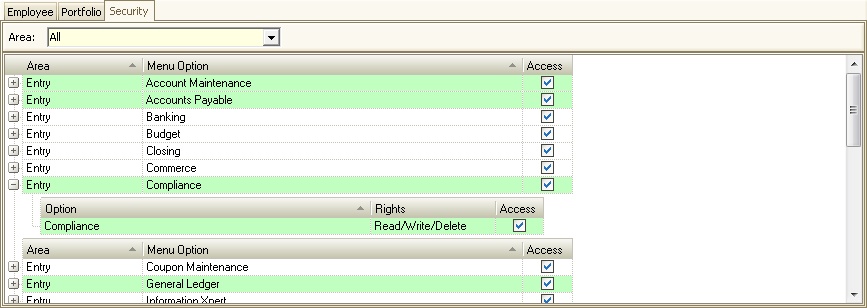
This topic was also previously covered in CLASS ONE: Employee, Master Information, Chart of Accounts.
How to link an employee to a Role:
1. Go to SETUP | Configuration Group | Employee Management.
2. Select the employee from the Employee dropdown menu.
3. In the Security Role field, select one of your pre-defined Roles from the dropdown menu.
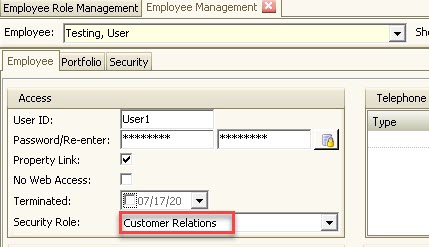
If you are linking the employee to a Role for the first time or if they are switching Roles, you will get this pop-up:
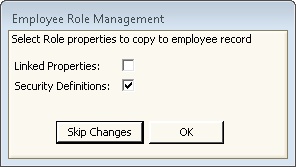
The options are defined as follows:
Option |
Description |
|---|---|
Linked Properties |
Selecting this box will link the employee to all the properties defined in the Portfolio tab for the specific Role selected. If this box is left blank, the employee will be linked to the properties defined for their user profile in SETUP | Configuration Group | Employee Management | Portfolio. |
Security Definitions |
Selecting this box will assign all the security rights defined for the Role selected. If the box is left blank, the employee will be linked to the security rights defined for their user profile in SETUP | Configuration Group | Employee Management | Security. |
4. Click OK to accept the options you selected. Clicking Skip Changes will abort your selections and the employee's Linked Properties and Security Definitions will not change.
|
A new template was recently added to the reports named EmployeeSecurityAccessExport, which can be added to a report group. This report is designed to be exported as a Text file and imported into Excel. The report shows each user's security rights defined in VMS. You can use this information to identify users with Program Defaults and Property Setup access, and proactively give access to the tabs for each user. |